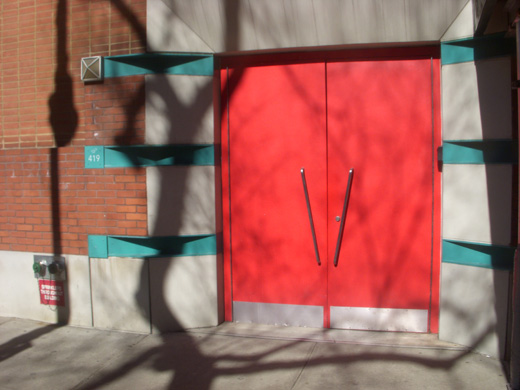Weekend Open Thread: Left to Right
Saturday, March 20th, 2010


¶ Matins: Marina Warner (a world-class expert on the subject, in our opinion) writes about the function of myth, at The Liberal.
¶ Lauds: Money does not appear to be what may have led Harvey Shipley Miller into error as sole trustee of the Judith Rothschild Foundation. Glory and honor are more like it. Listen hard enough, and you can still hear the clucking about the inappropriateness of a posthumous exhibit (in 1998) of Rothschild’s far from top-tier work in (NYT)
¶ Prime: Tyler Durden foresees “pitchforks and sawed-offs.”
¶ Tierce: For what it’s worth — an X if ever there was one — The Infrastructurist interviews IBM’s Vice President of Energy and Environment. Amidst the jargon, there’s some good thinking.
¶ Sext: The alliteration is so intense that we don’t know what Balk’s sentence means, nor care if it means anything at all. It’s just too psuper! From “You Will Never Find A Husband In New York.” (The Awl)
¶ Nones: In a fine piece at Slate (via The Morning News), Fred Kaplan puts his dukes right up. See also the commentary of AIPAC-nemesis John Mearsheimer at the LRBlog.
¶ Vespers: We’ve been waiting for Robert Darnton to discuss the Paleoblogosphere of ancien régime France, and now he has obliged (NYRBlog)
¶ Compline: Tony Judt’s sketch of his early, non-academic working life includes some very important observations about the indignity of most labor. (NYRB)

Preventive Medicine 102: I had an appointment with the dermatologist today. I pretended, to her assistant, that I didn’t really know why I was there. I could show off my lovely Mohs-surgery scar, and did. When Dr G peeled back the bandage, she and the technician cooed approvingly, and I wondered if they were thinking what I thought when I changed the bandage on Monday: that I was at Greenberg’s, looking at an impressively frosted cake. But if Dr G had referred the squamous-cell biopsy to Dr B, the Mohs surgeon, that was the end of her involvement. I wasn’t there for her to look at my Hostess Cupcake stitchery.
Nor was I really there for her to do a follow-up exam of [TMI]. I was there, the technician reminded me, for a full-body exam. Ick. I protested; excuses proliferated. Dr G reminded me that the exam was overdue; she also said, “I sound like your mother.” Mind you, I would not be going to a doctor who was old enough to be my mother. Dr G is older than my daughter, but not by much.
Because the [TMI] problem involved a degree of unbuckling and unbuttoning, I said to hell with it, meaning my resistance, and agreed to disrobe. Dr G naturally had to leave the room (?), but she promised to be right back. When she did not come right back, I realized that what I hate most about medical examinations is sitting around in my underwear (or worse). I do not sit around in my underwear at home. It bothers me not to be presentable. The fact that I’m at a doctor’s office makes no difference. Underwear is underwear.
After a long absence, Dr G returned, bursting with apologies. Even better, she ventured, as she began to examine the upper half of me, to ask my advice. Since I was a thoughtful person — how on earth had my dermatologist come to that conclusion? — what did I make of the very rude patient with whom she’d been dealing while I sat around in my underwear. The very rude patient was a thirty-something trophy wife who had to have everything done yesterday, in order to fly to Europe next week, and who not only didn’t want to pay for it, but couldn’t pay for it, notwithstanding such accoutrements as a Birkin bag in a color not seen before, Pucci everything-else, and a couple of Cartier tennis bracelets. Dr G was so exasperated that she suggested — “for the first time, really; I’ve been doing this a long time, and I’ve never lost it before” — that the lady “trade in” one of her bracelets for the cosmetic procedure that she didn’t want to/couldn’t pay cash American for. Astonishing fun though this repartee was, Dr G still wanted to know what the woman could have been thinking, carrying on the way she did.
I said that her refusal to pay was meant to signify that she was too important a person to have to pay for things. Dr G and the technician stepped back a bit and admired me — there is no other word, etymologically — as if I were some science fiction wizard. “You ought to be a shrink,” they said. I thought of all the shrinks who have not said this to me, and felt better about the full-body exam process. Sadly, not so much about the underwear.
Did I say “Pucci”? Dates me, don’t it.

¶ Matins: Fault lines deepen in America as the “Tenther” movement gains traction. Joe Jervis reports on gun-law nullification in South Dakota, while the Times considers the reactionary movement more generally.
¶ Lauds: New York’s City Center, built as a Shrine in the Twenties and repurposed in the Forties, is about to be freshened up by Polshek Partnership. (NYT)
¶ Prime: At the Columbia Journalism Review, Ryan Chittum notes (somewhat testily) that the new Lehman Brothers scandal — the firm was cooking its books while the regulators looked, or could have looked, over its shoulders — has received more comprehensive (and ongoing) coverage in the leading market blogs than in the mainstream prints.
¶ Tierce: At PsyBlog, a review of eight studies of cognitive fluency. A tricky piece.
¶ Sext: A French monoblog devoted to crunches at the Étoile: 2m40 is the height limit for the tunnel that runs beneath the traffic circle. (via MetaFilter)
¶ Nones: In a truly stinky-cheese move, Montenegro has granted (sold?) citizenship to Thai troublemaker Thaksin Shinawatra. Now everybody’s happy? (BBC News)
¶ Vespers: Far from being a recluse, J D Salinger appears to have been a man who, having written what he had to write, simply retired to normal life. Normal for 1950, that is, not for now. (Speakeasy)
¶ Compline: Jeffrey Toobin on John Paul Stevens, in The New Yorker.

It was the sort of day that makes me worry that I’m overly fond of the sound of my own voice. Well, not the sound, exactly — people say nice things about it, but it does nothing for me — but the content, which was old history gossip. After lunch, to which I was treated by a dear English friend who, like Nancy Mitford, came from much too nice a family to receive the education to which her intelligence entitled her, I was asked about the origins of the American Civil War. We had been talking about the Tenthers, and about the failure of leadership in American politics over the past half-century. (Now that I’m an old man, I admire Dwight Eisenhower for keeping the nation steady during the chthonic McCarthyite hysterias of the Fifties, and I fear that he was the last true leader to occupy the White House.) I hope that my answers exploded a number of myths.
Then at dinner, after watching Equivocation, Bill Cain’s rather overcharged play about Shakespeare and the Gunpowder Plot at MTC, Kathleen asked me to explain the English Civil War, which she claimed to know nothing about. (She was quite surprised to learn that Oliver Cromwell came from a county family.) I had the damnedest time saying “Charles II” when I meant “Charles I,” and vice versa, but at least I never confused James II with his grandfather, James I. Trying to trace the origins of the adversity between Crown and Parliament, all I could think of was John Hampden and Ship Money. I used to know about all those crises. (I still have JR Tanner’s undoubtedly outdated review of the constitutional disputes of Seventeenth-Century England.) Good old Archbishop Laud. Strafford and “thorough.”
I am still very much in the middle of Peter Wilson’s Thirty Years War — a bit past the middle, but only a bit. I’m dying to get to Steve Pincus’s 1688. It would be grand to re-read Cecily Wedgwood’s King’s Peace; I never did have The King’s War, but I’d like to read that, too. What could be more romantic than situating the capital of royalist England at Oxford? And, speaking of cavaliers and roundheads, there is no longer any doubt that The Young Victoria has made I Puritani my favorite opera in the world. I have begun efforts to follow Victoria’s advance to favoring Norma, an opera than the strange voice of Joan Sutherland made me quite dislike, but I am in no hurry. Vien diletto…
But how am I to get any reading done if I spend hours at a time rattling off the remnants of my decayed command of dates and fates? (I had to confess to Kathleen that I couldn’t for the life of me recall what became of Richard Cromwell.) And do I really care, if charming women are inclined to pump me for the low-down on select charters and documents illustrative of the reigns of Elizabeth and James I — and Queen Victoria, whose Prince Albert was, in Strachey’s opinion, the most able statesman in England at the time of his premature demise. Did you know that Albert’s last official act, composed on his deathbed, was to soften a British ultimatum that, in its original language, would have almost certainly provoked war between the Union and the United Kingdom? Now I must bone up on the Trent Affair, so that, next time I’m asked, I’ll be able to do more than gush that Prince Albert saved the day.

¶ Matins: At the end of this very well-titled piece, “Waiting For Something To Turn Up: Europe’s Looming Pensions-based Sovereign Debt Crisis,” Edward Hugh writes a paragraph that describes Americans just as well, even if the foundation of our nightmare is more manifold. (A Fistful of Euros)
¶ Lauds: Anne Midgette writes about the varieties of excellence in artistic performance. (Washington Post)
¶ Prime: The fall of Lehman Brothers (the second fall of Lehman, actually; there was one in the Eighties as well) was marked by a weird offset of desperately shambolic accounting with what Chris Lehman calls a “Foucauldian regime of total marital surveillance.” (The Awl)
¶ Tierce: Both Jonah Lehrer and David Brooks approach Washington from an acutely anthropological angle, in “Personal Narratives” and “The Spirit of Sympathy.” One hopes that the cognitive lesson that both men touch on — with regard to almost anything that you choose to name, the specific/individual and the general/collective trigger entirely different psychological responses — will quickly pass into common understanding.
¶ Sext: The fun thing about Lady Gaga, we think, is the alacrity with which so many writers accept her status as a performance artist worthy of a museum installation — or at least of catalogue-gravity prose. What we’d really like to hear more about is Ms Germanotta’s education, formal and otherwise. How has a young woman come to seem so knowing? Oscar Moalde swoons. (The House Next Door)¶ Nones: Christopher Hitchens on Benedict XVI: predictably but enjoyably sulphurous. (Slate; via 3 Quarks Daily)
¶ Vespers: At The Second Pass, Alexander Nazaryan interviews Donald Pease, the Dartmouth Professor who has just written a Life of Theodor Seuss Geisel. Who knew that Dr Seuss went to Dartmouth? That he drew Jewish caricatures to compensate for having been thought (erroneously) to be Jewish by a Dartmouth fraternity. Who knew? Well, we didn’t.
¶ Compline: Glenn Kenny has a good winge about the non-future of (paid) film criticism. (ARTicles; via Arts Journal)

If I were to try to tell you why today felt good, you’d horripilate at least. I’m used to that. I’ve been living at this level for about six months now, reorganizing the household as though I were Peter the Great designing the Table of Ranks.
I did get in a bit of writing. Two new Friday movie pages, one of them written last week but polished this afternoon, after I wrote the other from scratch. Pathetic, really — but headed the right way. You’ll be more interested to hear that Megan and Will dropped in. Yes, just like a sitcom! They were in the neighborhood (to see the new pediatrician, who’s up here) and wondered if they might just stop in. Does it get any better than that? In a word, no. I got to dandle Will for fifteen minutes. Then, before I had a chance to think of all the things that I was supposed to be doing, he was whisked away.
Will is on some sort of cusp, as how can he not be at a time when the period of a week has only just ceased to consitute a double-digit percentage of his life-span so far. At nearly eleven weeks of age, he is putting a lot of the newborn’s self-absorption behind, and trading it in for imperial toddlerhood. It’s the move from “universe” to “center of the universe.”
While I was holding him, his mother thought that perhaps his head was not quite as well-supported as it might be, and she gently pressed it back into my arm. He shot it forward the instant she released it, and her apology to him was all the reassurance that I needed. Did I tell you that he is such a prodigy that he is already (we think) teething?
At one point, we found ourselves in front of the full-length Second Empire mirror that my mother installed in our Bronxville foyer. There we all were, suddenly on the other side of where we’d been. Will’s face registered the sense of a slight problem, but he was not surprised; he did not wonder how we had vaulted through 180 degrees of space. None of the concepts that would ground such an observation are available right now. It occurred to me that the mind is much like the Internet (o irony): information is distributed among countless packets of neurons, all of which, in the case of the mirror’s reflection, are probably present in Will’s sensorium right now. What’s missing is the ability to put the packets together, as the Internet does when You’ve Got Mail. But because the packets are indeed all there, there will probably never be a moment in which Will suddenly understands what mirrors are all about. Bits of knowledge will have fused imperceptibly into understanding.
If I beg your indulgence of grandfatherly boasting, I also assure you that if Will were to do anything seriously ahead of himself I’d be stricken with alarm. I don’t want him to grow up a whit faster than his wont, and I look forward to many objectively tedious hours over the next six or seven years. But this afternoon I felt nothing less than joyous about his parents’ way with him. In one sense, certainly, we have all remade our lives somewhat to accommodate Will. But then, we’ve remade our world precisely to suit him, so that he can be part of a social bustle right now. If we adore him, it’s to make it easier for him to be part of our larger world.
Call it imperial (grand)parenthood.
Â

¶ Matins: As mains deteriorate, the American habit of regarding water as a free resource makes repairs politically difficult.Â
The root of the problem, in our view, is the Nineteenth-Century earnest devotion to the idea of Building to Last. Building to Update makes for steadier work. (NYT)
¶ Lauds: Jason Clark compares and contrasts two distantly similar shows On and Off Broadway, Geoffrey Naufft’s Next Fall and Alexi Kaye Campbell’s The Pride. (The House Next Door)
¶ Prime: “What Happens if America’s Credit Rating Is Downgraded?” Good things, perhaps. Perhaps just things that won’t happen otherwise. (NYT)
¶ Tierce: While we raise our eyebrows at a few of Sara Firisen’s implications about early education at home and abroad — she skirts the fact that kids elsewhere must work much harder in order to shine (and live in cultures that value slogging) — we think that she’s quite right to dismiss the claim that the pursuit of excellence is “elitist.” (3 Quarks Daily)
¶ Sext: Speakeasy wants to know: does the Best Actress award doom the winner’s marriage?
¶ Nones: Andrew Sullivan seems surprised by the familiar mode of the Vatican response to the latest outcrop of sexual abuse, this one in the current pope’s former archidiocese.
Surely, the Roman Catholic Church has seen itself as a victim since the days of Nero and Diocletian. (It’s what comes of being married to a crucified saviour.) Not that there hasn’t been some progress. Mr Sullivan won’t be burned alive, or forced to beg papal forgiveness by standing barefoot in the snows of Canossa. (Daily Dish)
¶ Vespers: Luke Epplin, who has lived in Santiago but slept through minor tremors, writes about the Chilean earthquake in literature. (The Millions)
¶ Compline: Hendrik Hertzberg brings us up to date on current bien-pensant thinking about nuclear power. (The New Yorker)

How pleasant it would be if we could average out our sharper feelings. I’d be only too happy to trade in the spikes of ecstasy that thrust me up from time to time for an end to the pits of bad feeling that rather more often yawn beneath me, usually when I’ve got to deal with an unpleasantness from a position of fatigue. My pleasures are increasingly cerebral anyway. My miseries are more emotional than ever.
Which is to say that they fly forgotten as a dream dies at the opening day, leaving me wondering what all the fuss was about. This morning, it was hard to tell which font of self-pity was weeping more profusely. On the one hand, I was about to undergo a bit of outpatient surgery that might last for hours. On the other, I had to be up and dressed and out of the house at the obscenely early hour of half-past eight. For at least the length of entire Second Avenue block, I developed the economic argument against my own continued existence: I have become too expensive to keep alive. Who benefits from my drawing breath? Raptures of self-abnegating renunciation ground to a halt when an inner voice murmured, “Kathleen.” I had to slog through the remainder of the walk to the dermatologist’s office (all the way down to 69th Street!) without benefit of high-flying remorse. Life can be very hard.
The worst of it was, of course, that I’m such an inconstant bastard. I simply can’t maintain a bad mood. Gentle Reader, you have no idea how much purple prose my awareness of this failing has spared you. It would be one thing if the certainty that I’ll feel better in half an hour had any emotional weight, but of course it doesn’t. It weighs exactly as much as the good advice that’s inflicted upon fifteen year-olds.  Â
The surgery took no time at all, really, and I did go to the movies after all (Green Zone). Afterward, I went for a shop. I eked out the Hours; I launched a new playlist (sans superstructure — just Mozart’s piano sonatas, Vivaldi’s La Stravaganza, and Thomas Allen singing Brahms). I made a cheddar omelette for Kathleen and a cheeseburger for myself. I read bulks of Major Pettigrew’s Last Stand. I had a lovely chat with Megan — lovely (at both ends) largely because she is living in a Real Apartment, and I feel her happiness at least 97% as keenly as I should do if it were I, and not she, who had just escaped Château Gizmo. Later, Megan sent some lovely photos of Will via email. Quaint! She didn’t upload them at Facebook, so I didn’t, either. I did print one for Kathleen to look at, though, because of the Defargéène subtext of the shoot (the subject of which is Will’s interest in a stylized tropical fish that Kathleen made a few years ago for a forgotten purpose): Keep Knitting! Â


¶ Julian Montague’s retro codex capricci. (The Rumpus)
¶ The dollhouse on the ceiling. (Parallel World; via The Morning News)
¶ The Sandpit.

Like all healthy boys, Will will resist his mother’s application of sun-block cream on summer afternoons. But then he will be reminded of the the dents and crevices in his Doodad’s noggin, remnants of what let’s hope will be the worst of the surgery, and he will remember the old gent’s constant hats.
This second round of Mohs was originally scheduled for the day of the big blizzard, last month. No movie today!


Last Sunday, Megan said to Ryan, “We need to move.”
On Monday, Ryan found some good listings
On Tuesday, Megan looked at apartments, including a place that she liked.
On Wednesday, papers were processed; certified checks were drawn.
On Thursday, a lease was signed.
On Friday, keys were handed over.
On Saturday, Ryan and an excellent friend schlepped bedding and basics through torrential spring rains to the new flat. Now Will has a new home.
A New York Minute can take an entire week, but, oh, my, the changes.

¶ What’s for breakfast? (Let There Be Blogs; via reddit)
¶ Deutschlands “schönste” Schulnamen. (Strange Maps)
¶ How long since Thunderball? (engadget; via The Morning News)

¶ Matins: Once you have clicked through and read today’s link, Harvard Magazine article, entitled “Nonstop,” about pathological overachievers among Crimson undergrads, we strongly urge you to re-read last Friday’s Matins. Together, these pieces convey a sense of the disservice being done to our default elite by the nation’s top schools. As “Nonstop” makes clear, however, the universities are merely responding to a problem that originates with seriously bad parenting — worse, again, among the elite.
¶ Lauds: Simon Russell Beale — a brilliant man who just happens to be a brilliant actor. (Guardian; via Arts Journal)
¶ Prime: Sad to say, this is truly a Must Read: Just when you thought that it couldn’t be done, the Epicurian Dealmaker defends investment bankers as purveyors of financial advice! And they said it couldn’t be done.
(Now that we read the fine print, maybe it’s that the EP forgives investment bankers for giving lousy advice.)
¶ Tierce: As a rule, we steer clear of touting pie-in-the-sky announcements at The Daily Office. We know that our faithful readers want results, not hot air! But we were so busy burping today that the charm of a healthy baby on our knee encouraged us to hope that he will grow up in a world with a herpes vaccine. Even though the New Scientist piece is startlingly self-deflating.
¶ Sext: We’re still burping. Joe Jervis breaks the news about Betty White, and we just click right through.
¶ Nones: Karl Rove continues to be an Ugly American. (BBC News)
¶ Vespers: The Second Pass celebrates its first anniversary with an omnibus of contributors’ paeans to out-of-print books. Here’s Sarah Douglas about her choice, Inside the Art World: Conversations with Barbaralee Diamonstein.
¶ Compline: Tony Judt’s sketches in The New York Review have been must-reads, but we’ve resisted linking to them for want of a decent introduction to the man (and to his dread affliction!), which everyone who knows something about him is far too conceited to admit to needing. New York to the rescue.

After spending the day watching an infant whose nervous system has yet to advise him that his head will always interrupt the arc of his backward-swinging fist discover his body, I spent the evening watching a troupe of men and women at the top of their form stop on dime after dime. The two experiences interbled, but only because Paul Taylor, the prince of euphoria, has not lost track of how we begin.


¶ Matins: A few days ago, Felix Salmon looked at the Zachary Kouwe plagiarism hoo-haw at the Times and took the opportunity to share an incredibly interesting insight: print media companies still don’t understand blogging. We’ve been chewing it over, and we’ve decided that we do.
¶ Lauds: Fundamentally silly but still full of goodies: Michael Kimmelman on Caravaggio (stop it with the Michelangelo already!) at the Times.
¶ Prime: What, exactly, is the “national debt” — besides scary-huge, that is? Bruce Bartlett lays it out, and, frankly, we recommend that you skip this part. (Capital Gains and Games; via Marginal Revolution)
¶ Tierce: Laura Miller discusses David Shenk’s explosive new book, The Genius in All of Us: Why Everything You’ve Been Told About Genetics, Talent, and IQ Is Wrong, admitting that it left her somewhat shaken. (Salon; via 3 Quarks Daily)
We have always suspected that, in a nation of post-Calvinists, genetic determinism is a naturally compelling misreading of the hard facts.
¶ Sext: Now what? Now that the Oscars have been awarded, what’s a Hollywood blogger to do? Speakeasy asks a couple of writers.
¶ Nones: The pith of Martin Wolf’s provocative Financial Times piece about Germany’s “Eurozone nightmare:”
¶ Vespers: What with Christopher Hitchens stuck in the limelight, we sought relief — and, hoo boy, found it! — in Christopher Tayler’s arch-browed LRB review of the Latest Volume of Clive James’s memoirs, The Blaze of Obscurity: The TV Years.
¶ Compline: Nick Paumgartner’s “The Ski Gods,” a riveting look into the sport’s dark side, lies on the other side of the firewall at The New Yorker, but Christopher Shea comments on two of its major points at Brainiac. First, the invented tradition thing. Second: why no women jumpers?

Plan A was to run a round of errands in the afternoon. Plan B was to catch up on the overdue Portico pages that have so alarmingly piled up (several books, three New Yorker stories, a movie, a play, and a concert). In the end, I settled on Plan C, because, after lunch, I felt both sleepy and gassy. The gassiness contraindicated gadding about, and the sleepiness ruled out writing. So I sat in my reading chair and swallowed Jonathan Dee’s The Privileges.
The day wasn’t a total loss. After the pizza that I ordered when Kathleen announced her homecoming, I sat down at my writing computer and sketched a lot of notes. It isn’t the same as writing, by any means, but at least it captures the raw material for writing that I so easily forget if I don’t write things down.
Why do I ever think that I’ll be able to remember something? Oh, there are plenty of things that I have no trouble remembering — but I’m never cautioned to write them down. The mystery at the moment is the crunchy alternative to sliced apple that I hit on when I adapted the curried chicken salad from Island, the Madison avenue bistro that Kathleen and I head off to on the odd Sunday afternoon. What can it have been? And how can I forget something that was perfect. Â

¶ Orbit designs a book cover. (via The Awl)
¶ Jean Ruaud’s crooked flues. (Mnémoglyphes)
¶ More Michigan Central Station photographs. (The Infrastructurist)

¶ Matins: Joe Jervis reports a weird but deplorable press release from the Patriots For A Model Utah, announcing proposed legislation to deport homosexuals from the state. However seriously it is intended to be taken, Joe’s concern is not without foundation
¶ Lauds: Eduardo Porter, reflecting on the brief Oscars blackout, wonders if it wouldn’t make sense to pay Disney the seven cents an hour it seems to want, and to stop thinking of television as “free.” It’s a question of how much your time is worth. (NYT)
¶ Prime: Jeffrey Pfeffer outlines a method for tying CEO compensation to company performance. (What? You thought that they were already linked?)(The Corner Office)
¶ Tierce: Why, if the brain is so smart — one of Jonah Lehrer’s readers wants to know why, “if the brain is so smart, why do half of all marriages end in divorce?” Mr Lehrer has some scientific things to say (“We adapt to our pleasures; we habituate to delight.”), but his ultimate authority seems to be Shakespeare. (The Frontal Cortex)
¶ Sext: All about pockets. (BBC; via The Morning News)
¶ Nones: Peter Mair sketches the new political landscape in the Netherlands, where the government collapsed last week on the issue of sending troops to Afghanistan.
¶ Vespers: Jim Behrle tells you everything that you need to know in order to become a celebrated poet “overnight.” It’s as funny as ground glass! (via The Awl)
¶ Compline: Our friend, George Snyder, reflects on the overlooked fact (it suits no one’s ego) that it’s not a good idea to expect your interesting friends to like each other. Case in point: Interior designer Herman Schrijver (1904-1972).